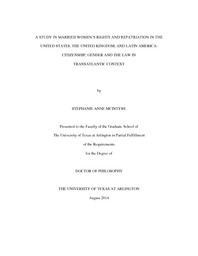
ATTENTION: The works hosted here are being migrated to a new repository that will consolidate resources, improve discoverability, and better show UTA's research impact on the global community. We will update authors as the migration progresses. Please see MavMatrix for more information.
Show simple item record
| dc.contributor.author | McIntyre, Stephanie Anne | en_US |
| dc.date.accessioned | 2014-09-17T17:30:04Z | |
| dc.date.available | 2014-09-17T17:30:04Z | |
| dc.date.issued | 2014-09-17 | |
| dc.date.submitted | January 2014 | en_US |
| dc.identifier.other | DISS-12775 | en_US |
| dc.identifier.uri | http://hdl.handle.net/10106/24749 | |
| dc.description.abstract | During the first half of the twentieth century, the United States and Great Britain, fearing the dramatic changes occurring in the Atlantic world due to increased migration and threats from war, denied many of their female citizens their natural-born right of citizenship. What was the reason for stripping these women of such a precious possession guaranteed by law? They married non-citizens. Without due process, the women could not be deprived of their citizenship, so laws were put into place proclaiming that when a woman married an alien man, she would automatically assume his citizenship. Because women did not have independent citizenship under the law, upon marriage to an alien man, the woman lost her own natural born citizenship that had come through her father. At the same time these laws were passed, women were campaigning for the right to vote. Within the campaigns on both sides of the Atlantic, a kindred spirit developed among the reformers that all women should have the same right of independent citizenship as the natural born men in their countries. Being ignored by their home governments, the women of the United States and Great Britain and the Dominion nations developed a transatlantic network designed to bring international pressure on their domestic governments to grant independent citizenship to women by law. As a result of their consistent and longsuffering campaigns, many women of the United States believed they were going to be granted independent citizenship in 1922 with the Cable Act, but the bill fell far short of their expectations. Cable Act reforms began almost immediately and continued until 1936, when all American women had the right to determine their own nationality. The Dominion nations, beginning with Canada in 1946, established independent citizenship for women, despite imperial law. Britain finally succumbed to the transatlantic pressure and granted women of the United Kingdom independent nationality in 1948. | en_US |
| dc.description.sponsorship | Cawthon, Elisabeth A. | en_US |
| dc.language.iso | en | en_US |
| dc.publisher | History | en_US |
| dc.title | A Study In Married Women's Rights And Repatriation In The United States, The United Kingdom, And Latin America: Citizenship, Gender And The Law In Transatlantic Context | en_US |
| dc.type | Ph.D. | en_US |
| dc.contributor.committeeChair | Cawthon, Elisabeth A. | en_US |
| dc.degree.department | History | en_US |
| dc.degree.discipline | History | en_US |
| dc.degree.grantor | University of Texas at Arlington | en_US |
| dc.degree.level | doctoral | en_US |
| dc.degree.name | Ph.D. | en_US |
Files in this item
- Name:
- McIntyre_uta_2502D_12775.pdf
- Size:
- 1.190Mb
- Format:
- PDF
This item appears in the following Collection(s)
Show simple item record


